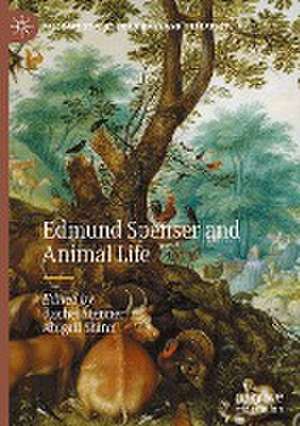Edmund Spenser and Animal Life: Palgrave Studies in Animals and Literature
Editat de Rachel Stenner, Abigail Shinnen Limba Engleză Hardback – 21 feb 2024
Din seria Palgrave Studies in Animals and Literature
- 18%
 Preț: 893.21 lei
Preț: 893.21 lei - 18%
 Preț: 944.82 lei
Preț: 944.82 lei - 15%
 Preț: 696.02 lei
Preț: 696.02 lei - 18%
 Preț: 785.11 lei
Preț: 785.11 lei - 18%
 Preț: 724.17 lei
Preț: 724.17 lei - 15%
 Preț: 585.08 lei
Preț: 585.08 lei - 15%
 Preț: 589.51 lei
Preț: 589.51 lei - 18%
 Preț: 785.42 lei
Preț: 785.42 lei - 18%
 Preț: 786.18 lei
Preț: 786.18 lei - 15%
 Preț: 699.28 lei
Preț: 699.28 lei - 18%
 Preț: 784.13 lei
Preț: 784.13 lei - 18%
 Preț: 779.08 lei
Preț: 779.08 lei - 15%
 Preț: 525.99 lei
Preț: 525.99 lei - 15%
 Preț: 585.90 lei
Preț: 585.90 lei - 18%
 Preț: 784.48 lei
Preț: 784.48 lei - 18%
 Preț: 783.05 lei
Preț: 783.05 lei - 15%
 Preț: 526.35 lei
Preț: 526.35 lei - 18%
 Preț: 891.02 lei
Preț: 891.02 lei - 15%
 Preț: 699.77 lei
Preț: 699.77 lei - 18%
 Preț: 727.31 lei
Preț: 727.31 lei - 18%
 Preț: 892.59 lei
Preț: 892.59 lei - 18%
 Preț: 1131.56 lei
Preț: 1131.56 lei -
 Preț: 383.50 lei
Preț: 383.50 lei - 15%
 Preț: 586.88 lei
Preț: 586.88 lei - 15%
 Preț: 585.57 lei
Preț: 585.57 lei - 15%
 Preț: 588.18 lei
Preț: 588.18 lei - 15%
 Preț: 576.06 lei
Preț: 576.06 lei - 15%
 Preț: 694.22 lei
Preț: 694.22 lei - 18%
 Preț: 785.11 lei
Preț: 785.11 lei - 18%
 Preț: 899.21 lei
Preț: 899.21 lei - 18%
 Preț: 732.07 lei
Preț: 732.07 lei - 15%
 Preț: 694.55 lei
Preț: 694.55 lei - 18%
 Preț: 897.14 lei
Preț: 897.14 lei - 18%
 Preț: 894.46 lei
Preț: 894.46 lei -
 Preț: 384.86 lei
Preț: 384.86 lei
Preț: 948.16 lei
Preț vechi: 1156.29 lei
-18% Nou
Puncte Express: 1422
Preț estimativ în valută:
181.52€ • 189.39$ • 152.16£
181.52€ • 189.39$ • 152.16£
Carte tipărită la comandă
Livrare economică 13-27 martie
Preluare comenzi: 021 569.72.76
Specificații
ISBN-13: 9783031426407
ISBN-10: 3031426401
Ilustrații: XV, 293 p. 8 illus., 4 illus. in color.
Dimensiuni: 148 x 210 mm
Greutate: 0.52 kg
Ediția:2024
Editura: Springer International Publishing
Colecția Palgrave Macmillan
Seria Palgrave Studies in Animals and Literature
Locul publicării:Cham, Switzerland
ISBN-10: 3031426401
Ilustrații: XV, 293 p. 8 illus., 4 illus. in color.
Dimensiuni: 148 x 210 mm
Greutate: 0.52 kg
Ediția:2024
Editura: Springer International Publishing
Colecția Palgrave Macmillan
Seria Palgrave Studies in Animals and Literature
Locul publicării:Cham, Switzerland
Cuprins
Chapter 1. Introduction : Edmund Spenser and Animal Studies.- Chapter 2. Did Edmund Dream of Shorthaired Sheep?.- Chapter 3. Spenser, Marine Life, and the Metaphysics of Extinction: Overfishing and the True Monsters of the Deep.- Chapter 4. The Politics of Hunting: An Aristotelian Reading of Edmund Spenser’s Amoretti 67.- Chapter 5. Errour’s Repercussions: Dragons, Race, and Animality in The Faerie Queene.- Chapter 6. Spenser’s ‘apish crue’: Aping in Prosopopoia or Mother Hubberds Tale.- Chapter 7. Scorned Little Creatures?: Insects and Genre in Complaints (1591).- Chapter 8. Spenser’s Parenthetical Butterflies.- Chapter 9. Good to think [with]’: Spenser’s Animals Against Materiality.- Chapter 10. A Fruitful-Headed Beast?: Rhyme in The Faerie Queene.- Chapter 11. Coursers and Courses in The Faerie Queene.- Chapter 12. Spenser’s Wings.- Chapter 13. Coda.
Notă biografică
Rachel Stenner is senior lecturer in Literature 1350–1660 at the University of Sussex. She has published on authors including Geoffrey Chaucer, William Caxton, George Gascoigne, Edmund Spenser, Alexander Pope, and William Baldwin. She is currently coediting Baldwin’s literary writings for publication with Boydell and Brewer.
Abigail Shinn is lecturer in Early Modern Literature and Culture at Goldsmiths, University of London. She is the author of Conversion Narratives in Early Modern England: Tales of Turning (Palgrave, 2018). She has published work in the fields of conversion studies, early modern popular culture, drama, and Spenser studies. She is currently working on a new book project: Spenser’s Popular Voices: Culture and Play.
Abigail Shinn is lecturer in Early Modern Literature and Culture at Goldsmiths, University of London. She is the author of Conversion Narratives in Early Modern England: Tales of Turning (Palgrave, 2018). She has published work in the fields of conversion studies, early modern popular culture, drama, and Spenser studies. She is currently working on a new book project: Spenser’s Popular Voices: Culture and Play.
Textul de pe ultima copertă
Caracteristici
Demonstrates engagement with animals in early modern literature beyond Shakespeare Connects animal studies as a critical approach with early modern scholarship Addresses topics of monstrosity, genre, animal ethics, and more
